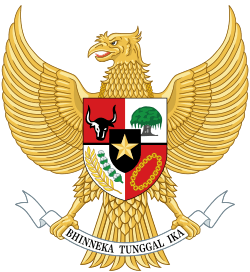Indonesians in Saudi Arabia
| Total population | |
|---|---|
| 550,000 (2004)[1] | |
| Regions with significant populations | |
| Jeddah, Mecca, Madinah, Riyadh | |
| Languages | |
| Indonesian, Arabic, Javanese[2] | |
| Religion | |
| Sunni Islam[2] |
Indonesians in Saudi Arabia consist largely of female domestic workers, with a minority of other types of labour migrants. As of 2004, an estimated 550,000 Indonesians were believed to be working in Saudi Arabia, comparable to the numbers of migrants from Sri Lanka, Sudan, and Egypt, but smaller than the groups from Bangladesh, India, Philippines and Pakistan, which number between 1 and 1.5 million people each.[1]
The Indonesian government signed an agreement with Saudi Arabia and other Middle Eastern governments on manpower exports in 1983; in that year 47,000 Indonesians went to Saudi Arabia. Their numbers grew rapidly; in the five-year period starting in 1989, Saudi Arabia took in a total of 384,822 Indonesian workers, 59% of all labour migration from Indonesia during that period.[2] Indonesian domestic workers find themselves quite vulnerable to abuse and exploitation by labour brokers and their employers, and the Indonesian government are reluctant to advocate very strongly on their behalf, for fear that the Saudi government might respond by cutting back on the number of visas issued to Indonesians performing the hajj. Ironically, Indonesian domestic workers typically find themselves unable to perform hajj or umrah during their stay in Saudi Arabia.[3]
Recruiters seeking to hire Indonesian women to work in Saudi Arabia typically focus their efforts on pesantren (Islamic boarding schools) in rural areas. Pesantren students are likely to have learned some Arabic in the course of their religious studies, which eases their communication with their employers; Saudi Arabia as a destination is more likely to appeal to devout Muslims such as the typical students at these schools, and employers in Saudi Arabia are also more comfortable hiring Muslims.[2] However, regardless of the religious bond, Saudi employers are often surprised that the Indonesian government allows unaccompanied women to travel and work overseas, unprotected by male relatives; they perceive the presence of Indonesian domestic workers in Saudi Arabia as representing a moral and economic failure on the part of the Indonesian government and the women's families.[3]
Roughly 39,000 Indonesians in Saudi Arabia registered to vote in Indonesia's 2004 presidential election through one of the 27 polling stations set up for them in the kingdom; they represented nearly half of all Indonesian in the Middle East who registered to vote.[4]
References
- 1 2 "Migrant Communities in Saudi Arabia", Bad Dreams: Exploitation and Abuse of Migrant Workers in Saudi Arabia, Human Rights Watch, 2004
- 1 2 3 4 Silvey, Rachel (2005), "Transnational Islam: Indonesian Migrant Domestic Workers in Saudi Arabia", in Falah, Ghazi-Walid; Nagel, Caroline, Geographies of Muslim Women: Gender, Religion, and Space, Guilford Press, pp. 127–146, ISBN 1-57230-134-1
- 1 2 Diederich, Mathias (2004), "Indonesians in Saudi Arabia: religious and economic connections", in Al-Rasheed, Madawi, Transnational Connections and the Arab Gulf, Routledge, pp. 128–146, ISBN 0-415-33135-8
- ↑ "Indonesians in Saudi Arabia register to vote presidential polls", BNA Reports, Bahrain News Agency, 2004-07-05, retrieved 2008-05-06
Further reading
- Husson, Laurence (1997), "Les Indonésiens en Arabie Saoudite pour la foi et le travail/Indonesians in Saudi Arabia for worship and work", Revue européenne des migrations internationales, 13 (1): 125–147, doi:10.3406/remi.1997.1535
- Silvey, Rachel (2004), "Transnational Migration and the Gender Politics of Scale: Indonesian Domestic Workers in Saudi Arabia, 1997-2000", Singapore Journal of Tropical Geography, 25 (2): 141–155, doi:10.1111/j.0129-7619.2004.00179.x
